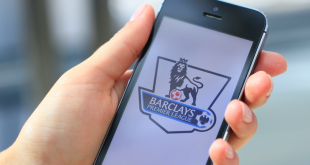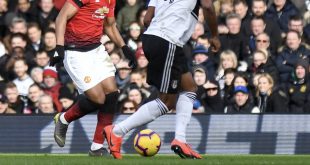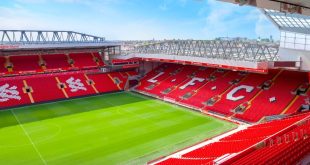 Manchester United have often vowed that Old Trafford will never be renamed despite reportedly being offered in the region £500m for the privelege. In 2013 a deal was arranged with Aon for the club’s training ground to be renamed Aon training complex. United will earn around £15m per year during the eight year deal but Ed Woodward was quick to reassure fans this would be the limit of the renaming, as he insisted that “Old Trafford will not be sold.”
Manchester United have often vowed that Old Trafford will never be renamed despite reportedly being offered in the region £500m for the privelege. In 2013 a deal was arranged with Aon for the club’s training ground to be renamed Aon training complex. United will earn around £15m per year during the eight year deal but Ed Woodward was quick to reassure fans this would be the limit of the renaming, as he insisted that “Old Trafford will not be sold.”
The rumour mill begs to differ however, with one particular rumour circulated by Richard Keys no less, gaining some attention.
“If I’m right there’ll be murders. Heard from a solid source Utd are in advanced talks to sell name of OT to Nike. Need the half billion”
@richardajkeys – 29 March 2014
It’s said that Nike have reportedly offered the club a deal worth £500m, one which the already unpopular Glaziers are said to be seriously considering, but at this point this is nothing but hearsay. Should it occur a reaction similar to that which Mike Ashley experienced would be the most likely outcome. Newcastle and Man Utd are two clubs whose stadium names are so closely tied to their identity that to change them would, in the opinion of many, be to tear the heart out of them.
As such should the likes of Manchester United not buck the trend then it’s possible that everybody will get in on the act sooner if not later. After all perhaps the era of a stadium’s name mattering is past, out with Fergie and Old Trafford and in with the Nike Stadium and Louis Van Gaal.
To reason this way however is to reason without a thought for that oh so vital ingredient to a successful club; the fans. After ferocious disapproval surrounding the renaming of St.James Park, Newcastle fans launched a campaign to overrule the decision for it to become the Sports Direct Arena. Former chairman and fan of the club, Freddy Shepherd also hit out at the name change detailing how the name St.James Park had been in place for 119 years.
Owner Mike Ashley was subject to continued abuse and a Sports Direct store in Newcastle was even vandalised. New sponsors Wonga, who also purchased the naming rights, were the ones to revert the decision. A spokesperson on behalf of Wonga said; “Football is an emotional sport and it is obviously really important to them. We listened to what they wanted and that is why we did it.”
Fans are rarely pleased when a home ground is renamed, especially to something as bland and characterless as the Sports Direct Arena. Over at Bolton, fans gradually became accustomed to their stadium endorsement (seemingly due to the locality and links between Reebok and Bolton) but there was considerably opposition at the time. Just how, en masse, they’ll take the latest news of its renaming to the Macron Stadium is anyone’s guess but some fans have taken to Twitter to divulge their disapproval.
After all there’s something in a name. That hallowed ground where generation after generation of families go each home game, rain or shine, to cheer on their team, to socialise, to cry, hope, laugh and dream. So when a new owner announces that this stadium, which has been retained its name for over 50 years is to from now on go by the name of Microsoft Apple Arena (or something..) it’s no great shock that there is often some quite negative feeling.
With more and more foreign owners however, and so less and less with sentimental club or area ties, these pleas fall on deaf ears. It is too often all about the money. Of course this is understandable; even in the Championship these days you need an ever increasing budget to seriously compete. For sides in the lower leagues it is yet more understandable; these deals are often a case of keeping a club afloat rather than earning an extra few bucks.
Make it work
In the short history of UK stadium sponsorship to date there is one main lesson to take away. If you’re going to sponsor a stadium, make it a new one. Rebranding a stadium is a dangerous practise; you risk the wrath of the fans. And hell hath no fury like dedicated football fans scorned.
In terms of evidence for this, you need look no further than Newcastle who after a costly procedure are now once again playing their home games at St.James Park.
Arsenal, meanwhile, received very limited opposition to their relocation to the Emirates despite fans’ infatuation with Highbury, a ground which they’d occupied since 1913. Likewise new, commercially branded stadiums were met without a enraged reception with Middlesborough, Hull City, and Stoke. The fan base of each club seemingly viewing it as their side making a step up, and the corporate endorsement an acceptable price to pay for a new all improved home ground.








